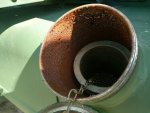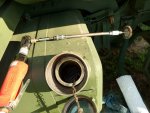- 3,420
- 1,497
- 113
- Location
- The actual midwest, NM.
Would the adjustments not allow centering the axle, or did you bend the bars to get it done quicker?I did add some to in and bent the track bars a bit to get the rear axle tracking right.
Steel Soldiers now has a few new forums, read more about it at: New Munitions Forums!

Would the adjustments not allow centering the axle, or did you bend the bars to get it done quicker?I did add some to in and bent the track bars a bit to get the rear axle tracking right.
My bars, like most of the Texarkana trucks are bent because they got lifted up by a telehandler on them. I wonder of some of the handling issues people have might be because the rear axle is cocked and articulated forward shortening the track?Would the adjustments not allow centering the axle, or did you bend the bars to get it done quicker?
Today I learned several things while spending a few hours trying to clean out the tank. One is that the (formerly) parts SEE really is a SHEE.
Since this particular tank won't come out easily, the cleaning consisted of draining, scraping, wiping, and scrubbing. This was repeated three times, while wishing that the pressure washer somehow could be made to spray diesel instead of water.
Partway through, the line from the valve to the pickup was blown out with compressed air since yesterday's adventures indicated that the pickup was blocked, again.
Maybe half a coffee cup's worth of crud came out this time, making the total about three or four full cups. Surely there's more towards the rear of the tank, which I couldn't reach.
What likely happened is that the solidified "JP8 chemical reaction remains" got loosened up once subjected to anti-gel and other additives, turning into crud with particles ranging in size from fine sand to coffee grounds and slightly larger.
Took a test drive and got about twice as far as yesterday before fuel starvation symptoms set in again. Not enough fuel flow to support 2,300 rpm in high gears - which is something I would normally never aim for, but I want this fuel problem fixed.
One final (desperate?) thought was to clean the strainer's filter. While the cup has been cleaned out numerous times, I don't think that I ever cleaned the filter itself. This bright idea was triggered after seeing how much fine stuff was floating around in one of the pails the fuel had been drained into. I'm used to just dumping out the big stuff, not paying attention to the filter itself.
Took some parts cleaner and sprayed away, reinstalled (there was very little crud in the strainer this time, by the way) and took another test drive. Finally! No guarantees, but that might have been the final thing. Well, until more crud plugs up the pickup and/or strainer, anyway.
So what I've learned is that if there's a vacuum in the strainer, there are no air leaks farther upstream.
Having chased air leaks for a long time, it seems that an empty (no fuel) strainer is a sure sign of air leaks. Before or after the strainer.
New copper washers are so worth it. In my trials with an electric pump, there were never any visible leaks, yet things improved with new washers.
A bad pickup tube (pinhole) could make the vehicle run only with a certain amount of fuel in the tank. Thankfully, that's not something I've experienced, yet.
Not enough fuel, but the strainer is full, may indicate a bad vent on the tank or a blocked pickup tube.
Now that the SHEE runs better than ever, perhaps an explanation of that new name is in order.
SHEE needs constant attention, or gets moody. Even after installing new shoes, SHEE wasn't happy for very long. Then there's the leak in the rear which isn't constant, but periodic.
I could go on, but you get the idea.View attachment 681147View attachment 681148View attachment 681149

Ah, I guess I misunderstood you then. You didn't bend the bars, you straightened them a bit, right?My bars, like most of the Texarkana trucks are bent because they got lifted up by a telehandler on them. I wonder of some of the handling issues people have might be because the rear axle is cocked and articulated forward shortening the track?
Yikes! I'd give that tank's interior a bath in N-Terpinal (or one of the now common brands, such as Evapo-Rust - which is probably an N-Terpinal product anyway).If you recall, I dropped the fuel tank on FLU #2 last summer and scrubbed it clean. Less than a year later the entire inside of the tank is once again covered in this rust looking growth (top to bottom) and once again causing problems with clogging the strainer screen. You can see by this photo, it looks like the tank had never been cleaned. It's interesting that the other FLU I picked up from the same GP location (same year model) has a problem free fuel tank.
I thought condensation as well, but I keep the tank topped off, and the rusty stuff covers the entire inside of the tank.Yikes! I'd give that tank's interior a bath in N-Terpinal (or one of the now common brands, such as Evapo-Rust - which is probably an N-Terpinal product anyway).
Then you'll have to figure out where all that moisture comes from. I'd think it has to be condensation.
I was afraid you'd say that. Bad fuel doesn't make sense to me, either, as the water should go to the bottom.I thought condensation as well, but I keep the tank topped off, and the rusty stuff covers the entire inside of the tank.

I'd think the filters did their job and kept the crap out of the injection pump. The fungus/bacteria is probably all throughout the system, but when even modern and much more finicky pumps can tolerate that, I don't think it's an issue on a SEE.I have ordered the complete fuel filter assembly and the screen filter near the tank for replacement. I just hope this brown fungus has not contaminated anything in the Bosch fuel injection pump. Has anyone fighting this mystery sludge ever found traces on the high pressure side of the fuel system and had to remove the Bosch pump for cleaning?

